In the latest episode in a long-running dispute between Israel and the Holy See, the Jerusalem municipality demanded on Monday that the Vatican-owned Notre Dame of Jerusalem Center pay overdue city property taxes of NIS 18 million ($5 million), placing a lien on the institution’s bank accounts until it settles the payment.
Religious institutions in Israel, including churches and monasteries, are exempt from paying property tax. However, in recent years, Israel has sought to come to an agreement with the Vatican that would place Church-owned commercial enterprises — like hotels and coffee shops — under taxation.
Shortly before Christmas, municipality lawyers wrote to Isracard and Visa, asking that they block Notre Dame funds, according to the site’s general manager, Yousef Barakat.
“We don’t have any money in hand,” Barakat told The Times of Israel on Monday evening. “This is a political issue that should be solved between Israel and the Vatican.”
The Notre Dame center, which includes a church and a guest house, has been working through the Vatican to solve the issue.
Get The Times of Israel's Daily Edition by email and never miss our top stories
Shortly after the Vatican and Israel signed the Fundamental Agreement that established diplomatic ties between the two states in 1993, the sides entered talks to resolve outstanding tax and property rights issues.
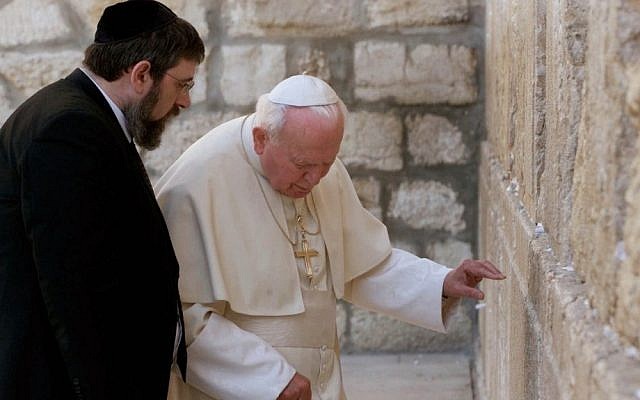
Rabbi Michael Melchior with Pope John Paul II at the Western Wall on March 26, 2000. (Jerome Delay/AP)
Those on-again, off-again talks have not been concluded over the ensuing decades.
The Church’s position is that since the sides have not come to a final agreement, the existing arrangement in which no properties are taxed should remain in force.
The state has not fought this claim, but in 2018, the Jerusalem municipality decided — citing the legal opinion of Gabriel Hallevy, whom it described as an international law expert — that the exemption for churches applies only to properties used “for prayer, for the teaching of religion, or for needs arising from that.”
The church argues that the guest house functions as a religious institution, and should be exempt from the taxes. It points at precedents during the Ottoman, British, and Jordanian periods, and sees itself as protected by the Ottoman Status Quo declaration in 1852. It also sees the exemption as codified in British Mandate legislation in 1934 and 1938.
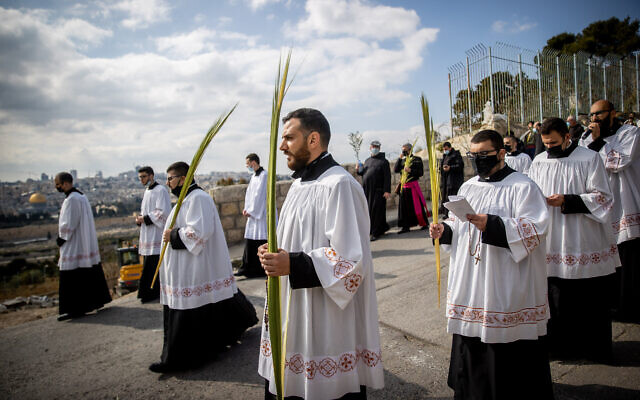
Christian pilgrims take part in the traditional Palm Sunday procession on the Mount of Olives, March 28, 2021. (Yonatan Sindel/Flash90)
“The Church leaders claim… since they are religious bodies that maintain educational, welfare, and charitable institutions that serve the local population,” wrote a Rossing Center study, “and that they effectively fill the role of the state in the areas, so that – according to their perspective – the state should support them rather than imposing taxes on them.”
“We are a non-profit serving pilgrims,” Barakat insisted. “We encourage tourism in Jerusalem. This is how we are repaid?”
However, the municipality views the center as a commercial entity obligated to regular business property taxes. Also, with churches holding thousands of dunams in the heart of the city — one of Israel’s poorest — the municipality is losing out on significant tax revenue.
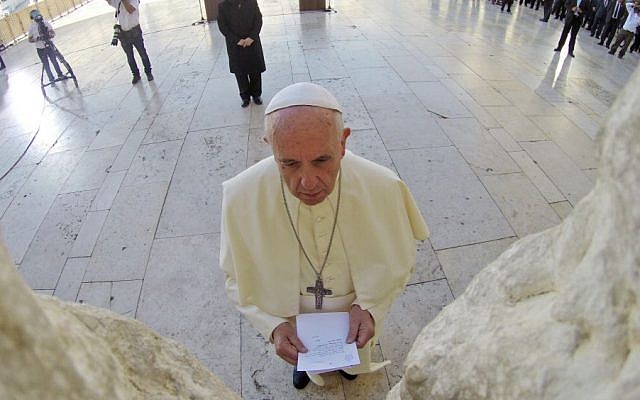
Pope Francis seen praying in front of the Western Wall, the holiest site where Jews can pray, in Jerusalem’s Old City, on May 26, 2014. (Kobi Gideon/GPO/Flash90)
The issue came to a head in early 2018, after the municipality’s decision to tax some Church properties, when then-mayor Nir Barkat froze the bank accounts of several churches in Jerusalem.
There were also Knesset members proposing at the time that the state expropriate land belonging to the churches in central Jerusalem.
In retaliation, the leaders of the Greek Orthodox and Armenian churches and the Catholic Custos of the Holy Land closed the Church of the Holy Sepulcher, and published a joint declaration that Israeli policies were “of a similar nature” to European anti-Jewish laws in earlier times.
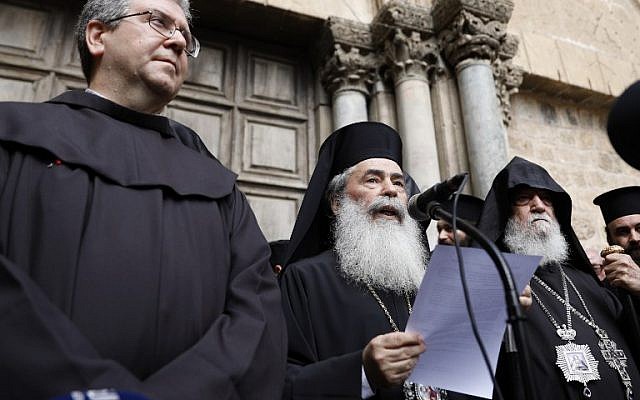
Greek Orthodox Patriarch of Jerusalem Theophilos III delivers a statement to the press as he stands next to the Custodian of the Holy Land Fr. Francesco Patton and Armenian Bishop Siwan (L) on February 25, 2018, outside of the closed doors of the Church of the Holy Sepulcher in Jerusalem’s Old City. (AFP Photo/Gali Tibbon)
At that time, Prime Minister Benjamin Netanyahu appointed then-regional cooperation minister Tzachi Hanegbi to find a compromise, and the two sides nearly came to terms, with the Vatican agreeing to pay taxes on many of its commercial ventures.
But a final agreement was never signed. The Vatican asked to reopen talks over expanding the Church’s rights in the Cenacle on Mount Zion, and a series of Israeli elections meant that government officials simply did not have the bandwidth to focus on Israel’s talks with the Vatican.
Since then, the issue has remained the purview of junior officials, and no senior ministers have been involved.
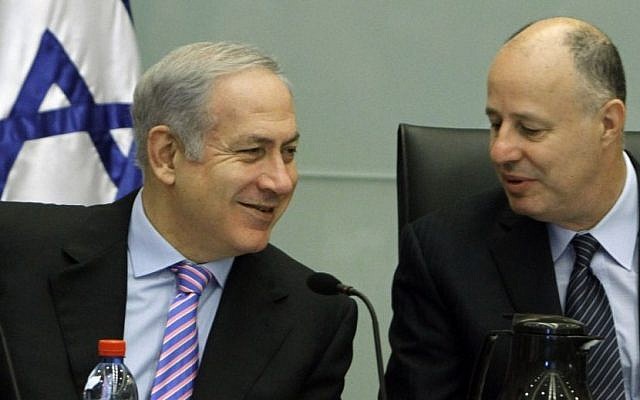
Tzachi Hanegbi (right) and Prime Minister Benjamin Netanyahu. (Miriam Alster/Flash90)
The municipality building is located a few hundred meters from the Notre Dame of Jerusalem Center, the site of the guest house, which has served Christian pilgrims visiting the holy city since it opened in 1888.
Other hotel owners in the capital told the municipality director general that they would turn to the Supreme Court, claiming that city hall’s failure to extract a payment from Notre Dame created unfair competition.
In a statement published by Kan, the municipality said: “The hotel operates like any other business in the city. The lien was applied after years of the hotel avoiding settling the issue with the municipality, despite repeated requests.”
“This is an old issue,” said Barakat. “It happens whenever there is a new mayor or new government.”
Tensions between Israel and the churches have increased recently, following a spate of attacks by Jewish extremists against Christian sites.
Last week, an American Jewish tourist was arrested after he vandalized a statue in the Church of the Flagellation in Jerusalem’s Old City.
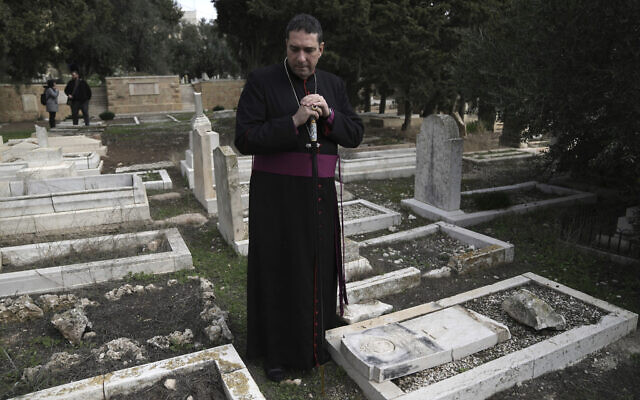
Hosam Naoum, a Palestinian Anglican bishop, pauses where vandals desecrated more than 30 graves at a historic Protestant Cemetery on Jerusalem’s Mount Zion in Jerusalem, January 4, 2023. (AP Photo/ Mahmoud Illean)
In January, a Christian Maronite community center in the northern city of Ma’alot-Tarshiha was vandalized by unknown assailants after worshipers returned to the venue following the Christmas period.
In a separate incident at the time, Jerusalem’s Armenian community was targeted by vandals, with multiple discriminatory phrases graffitied on the exterior of buildings in the Old City’s Armenian Quarter.
A week before that, two Jewish Israeli teens were arrested on suspicion of vandalism at a Christian cemetery in Jerusalem that resulted in damage to roughly 30 graves at the Mount Zion site.
Ashley Obel contributed to this report.


